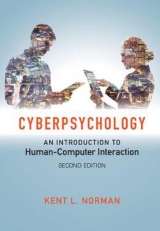
Cyberpsychology
Cambridge University Press (Verlag)
978-0-521-86738-2 (ISBN)
- Titel erscheint in neuer Auflage
- Artikel merken
Cyberpsychology is about humans and computers and the psychology of how they interact. Computers permeate nearly every human activity in the modern world and affect human behavior from the most basic sensory-motor interactions to the most complex cognitive and social processes. This book begins with a brief history of psychology and computers and a comparison of the human nervous system and the circuitry of a computer. A number of theories and models of human-computer interaction are presented, as well as research methods and techniques for usability testing. Following the typical contents of an introduction to psychology, the book then discusses sensation and perception, learning and memory, thinking and problem solving, language processing, individual differences, motivation and emotion, social relations, and abnormal behavior as they impact the human-computer interface. Finally, specific issues of artificial intelligence, assistive technologies, video games, and electronic education are presented. Cyberpsychology is the new psychology.
Kent Norman received his doctorate from the University of Iowa in experimental psychology and is an associate professor in the Department of Psychology at the University of Maryland. He is the director of the Laboratory for Automation Psychology and Decision Processes (LAPDP) and is a founding member of the Human/Computer Interaction Laboratory (HCIL) in the University of Maryland Institute for Advanced Computer Studies (UMIACS). His research is on judgment and decision making and problem solving, particularly as they pertain to human-computer interaction and cognitive issues in interface design. Dr. Norman is the author of The Psychology of Menu Selection: Designing Cognitive Control at the Human/Computer Interface, and he is the developer of HyperCourseware™, a Web-based prototype for electronic educational environments reported on in his online text: Teaching in the Switched On Classroom (1999, http://lap.umd.edu/soc). He is co-author of the QUIS: The Questionnaire for User Interaction Satisfaction, licensed by the university to corporate and government usability labs, and he is currently doing research on 'computer rage'. Dr Norman is the author or co-author of more than 80 journal articles and book chapters.
1. Introduction: importance, implications, and historical perspectives; 2. Fundamentals: biological and technological bases; 3. Theoretical approaches: models and metaphors; 4. Research: modes and methods; 5. Sensory-motor interfaces: input and output; 6. Learning and memory, transfer and interference; 7. Cognitive psychology: thinking and problem solving; 8. Language and programming; 9. Individual differences: people, performance, and personality; 10. Motivation and emotion at the human-computer interface; 11. Interpersonal relations; 12. Abnormal behavior and cybertherapies; 13. Automation and artificial intelligence; 14. Assistive and augmentive technologies; 15. Media: games, entertainment, and education; 16. The future: the ultimate human-computer interface.
| Zusatzinfo | 37 Tables, unspecified; 10 Halftones, unspecified |
|---|---|
| Verlagsort | Cambridge |
| Sprache | englisch |
| Maße | 186 x 261 mm |
| Gewicht | 940 g |
| Themenwelt | Geisteswissenschaften ► Psychologie |
| Informatik ► Software Entwicklung ► User Interfaces (HCI) | |
| ISBN-10 | 0-521-86738-X / 052186738X |
| ISBN-13 | 978-0-521-86738-2 / 9780521867382 |
| Zustand | Neuware |
| Haben Sie eine Frage zum Produkt? |
aus dem Bereich



